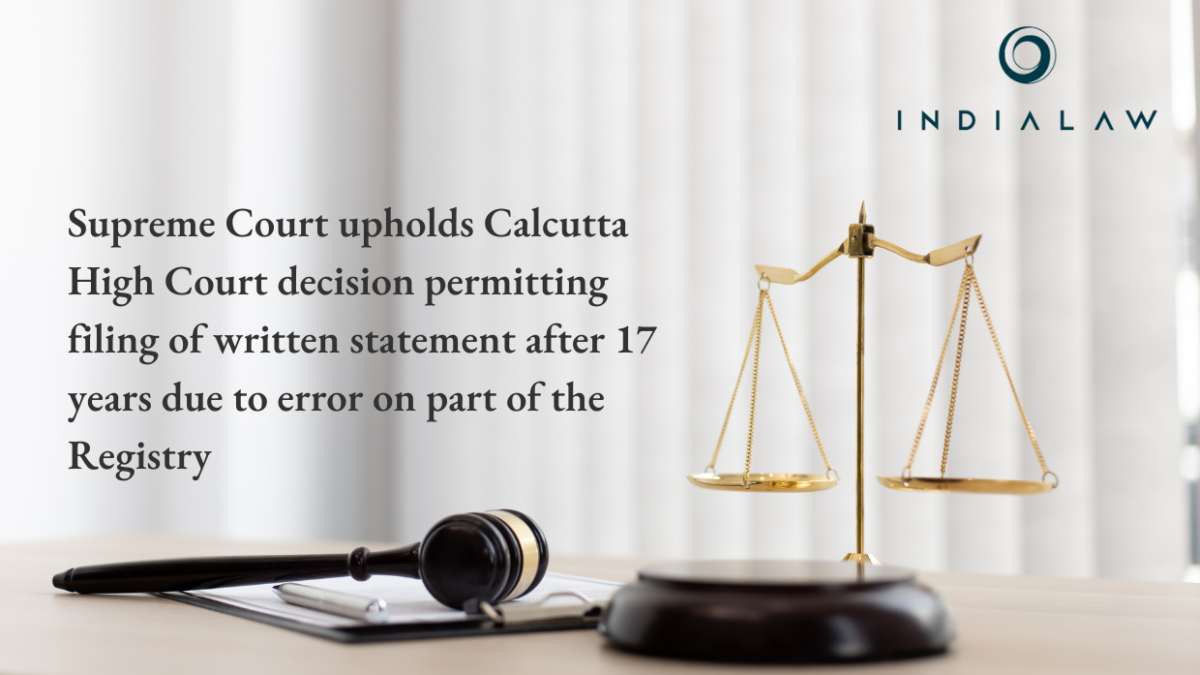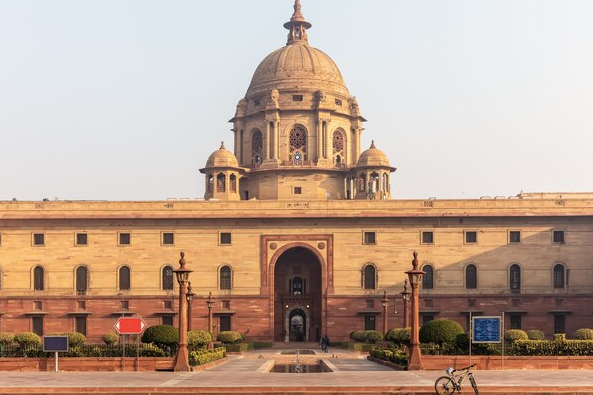Supreme Court upholds Calcutta High Court decision permitting filing of written statement after 17 years due to error on part of the Registry


The Hon’ble Supreme Court (“SC”)[i] has recently passed a judgment in the case of PIC Departmentals Pvt. Ltd. v. Sreeleathers Pvt. Ltd.[ii], arising out of the judgment[iii] of a Division Bench of the Hon’ble Calcutta High Court (“HC”) which directed the taking on record of the written statement being filed by a defendant in a suit despite the fact that the same was being filed with a delay of more than seventeen years. In doing so, the SC has reiterated the well settled principle that the rules of procedure serve to ensure the upkeeping of justice, however, they are not to be followed so rigidly that substantive justice is prevented from being done between litigants.
In the present case, a suit[iv] for declaration and permanent injunction was filed by the petitioner-plaintiff against the respondent-defendant. The position of the parties was that the petitioner was a tenant on the ground floor in respect of the suit premises, and the respondent was the tenant of the first floor therein. The suit was filed claiming obstruction due to the signboard of the respondent caused to the hoarding put up by the petitioner. Summons were served in the suit on 3rd February, 2000. Thereafter, on 29th February, 2000, an interim order of restraint was passed by the HC, in an interim application made therein.
The scenario that arose in the suit thereafter is quite peculiar, to say the least. After the restraint order was passed, for an unidentifiable reason, the case status of the suit was displayed as ‘disposed’ on 1st March, 2000. For close to seventeen years thereafter, no action was carried out, other than filing of contempt petition in terms of the order of restraint. However, on 17th January, 2017, the suit was suddenly listed before a Ld. Single Judge of the HC. This prompted an internal enquiry as to the reason for the purported disposal of the matter, without any orders in that regard.
Thereafter, the respondent filed an application in 2017, seeking extension of time to file its written statement. In 2023, the HC decided the application in favour of the respondent, by directing the Ld. Registry to accept the written statement and take the same on record, subject to payment of costs of Rs. 25,000/- to the petitioner. The petitioner, however, refused to accept the costs and being aggrieved by the order of the HC, assailed the same before the SC.
The petitioner contended before the SC that no indulgence ought to be shown to the respondent, and supported this contention with the proposition that the SC has previously held that the discretion to allow defendants to file written statement beyond the 90-day period could be exercised only if it is specifically found that it is not a case of laxity or gross negligence or if it is an exceptionally hard case.[v] The respondent contended that the discretion afforded to it by the Division Bench of the HC was perfectly justified in terms of the errors that had occurred due to the Ld. Registry of the HC.
The SC, in its reasoned decision, upheld the decision of the HC and directed that there was no reason to interfere with the same. In doing so, it held that in the present case, no delay or laches could be placed at the doorstep of the respondent. The entire problem arose when the suit before the HC was displayed as ‘disposed’ on the website of the HC. In this backdrop, the SC held that a court exercising discretion in accepting written statements post the 90-day period provided would be based on if the delay could be said to be due to the fault of the party making such request or if such request was indeed genuine. In the latter instance, the court is empowered to exercise its discretion and accept the written statement. The SC relied on the principle that procedural laws are primarily intended to achieve the ends of justice and, normally, not to shut the doors of justice for the parties at the very threshold.[vi]
In the opinion of the authors, the present judgment is an excellent authority on the right usage of the court’s discretionary power to accept a written statement beyond the 90-day period mentioned. It is further an important reference point for all to understand in what circumstances may the procedural hardships be removed for ensuring substantive and complete justice being achieved between parties.
[i] The coram comprised of Sudhanshu Dhulia and Ahsanuddin Amanullah, JJ.
[ii] Petition for Special Leave to Appeal (Civil) No. 14902 of 2024.
[iii] Judgment and order dated 22nd March, 2024, in APO No. 147 of 2023, Hon’ble Calcutta High Court.
[iv] C. S. No. 549 of 1999.
[v] Reliance was placed on the following judgments by the petitioner: Prakash Corporates v. Dee Vee Projects Limited (2022) 5 SCC 112, Kailash v. Nanhku (2005) 4 SCC 480, Salem Advocate Bar Association T. N. v. Union of India (2005) 6 SCC 344, R. N. Jadi and Bros. v. Subhashchandra (2007) 6 SCC 420, Zolba v. Keshao (2008) 11 SCC 769, Mohammed Yusuf v. Faij Mohammed (2009) 3 SCC 513, and Atcom Technologies Limited v. Y. A. Chunawala and Company (2018) 6 SCC 639.
[vi] The SC relied on the following judgments: State of Gujarat v. Ramprakash P. Puri (1970) 2 SCR 875, Sushil Kumar Sen v. State of Bihar (1975) 1 SCC 774, State v. M. Subrahmanyam (2019) 6 SCC 357, and Mahadev Goving Gharge v. The Special Land Acquisition Officer (2011) 8 SCR 829.




